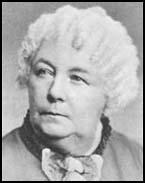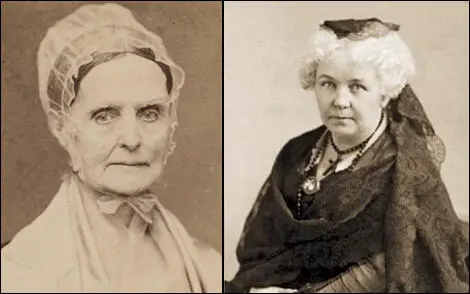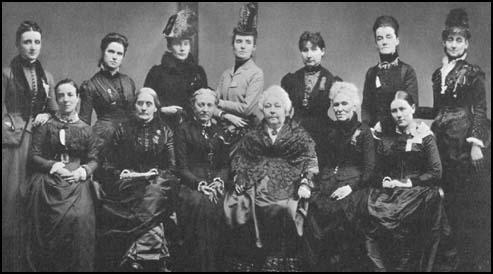Elizabeth Cady Stanton

Elizabeth Cady, the daughter of Daniel Cady, a lawyer and politician, was born in Johnstown, New York, 12th November, 1815. She studied law under her father, who later became a New York Supreme Court judge. During this period she became a strong advocate of women's rights.
In 1840 Elizabeth married the lawyer, Henry Bewster Stanton. The couple both became active members of the American Anti-Slavery Society. Later that year, Stanton and Lucretia Mott, travelled to London as delegates to the World Anti-Slavery Convention. Both women were furious when they, like the British women at the convention, were refused permission to speak at the meeting. Stanton later recalled: "We resolved to hold a convention as soon as we returned home, and form a society to advocate the rights of women."
However, it was not until 1848 that Stanton and Lucretia Mott organised the Women's Rights Convention at Seneca Falls. Stanton's resolution that it was "the duty of the women of this country to secure to themselves the sacred right to the elective franchise" was passed, and this became the focus of the group's campaign over the next few years.

In 1866 Stanton, Lucretia Mott, Susan B. Anthony and Lucy Stone established the American Equal Rights Association. The following year, the organisation became active in Kansas where Negro suffrage and woman suffrage were to be decided by popular vote. However, both ideas were rejected at the polls.
In 1868 Stanton and Susan B. Anthony established the political weekly, The Revolution, and the following year the two women formed a new organisation, the National Woman Suffrage Association (NWSA). The organisation condemned the Fourteenth and Fifteenth amendments as blatant injustices to women. The NWSA also advocated easier divorce and an end to discrimination in employment and pay.

Another group, the American Woman Suffrage Association (AWSA), was also active in the campaign for women's rights and by the 1880s it became clear that it was not a good idea to have two rival groups campaigning for votes for women. After several years of negotiations, the AWSA and the NWSA merged in 1890 to form the National American Woman Suffrage Association (NAWSA). Stanton was elected as NAWSA first president but was replaced by Susan B. Anthony in 1892.
Stanton was also a historian of the struggle for women's rights and with Susan B. Anthony and Matilda Joslyn Gage, complied and published the four volume, The History of Woman Suffrage(1881-1902).
Elizabeth Cady Stanton, whose autobiography, Eighty Years and More, was published in 1898, died in New York, on 26th October, 1902.
Slavery in the United States (£1.29)
Primary Sources
(1) Editorial, Time and Tide (9th July, 1926)
Feminism, like any other great movement, proceeds at varying paces and in varying forms in different countries. Few things are more enlightening than a study of the inter-reactions of the feminist movement in the two great English speaking peoples during the past seventy or eighty years. It is curious how closely related have been the movements on the two sides of the Atlantic. Each has continually learnt from the other. Beginning with Mary Wollstonecraft in the late 18th century, the feminist movement owed its next big impetus (in the eighteen forties and fifties) to Lucretia Mott and Susan B. Anthony, of New England. It was Lucretia Mott and Elizabeth C. Stanton who organised the first Equal Rights Convention which was held in New York in 1848; and it was Lucretia Mott who laid. down the definite proposition which American women are still struggling to implement today: 'Men and Women shall have Equal Rights throughout the United States.' A few years later Susan B. Anthony, the pioneer Suffragist, came into the American movement.
It was not till the eighteen sixties that the political feminist movement came alive in Great Britain. Dame Millicent Fawcett was even in those early days one of the leading names connected with it. The British suffragists pushed forward enthusiastically for some twenty years, but the failure to achieve success in 1885, when the third Reform Bill was passed giving the agricultural labourer the vote, seemed to take the heart out of our early suffragists, and the movement died down again. Meanwhile, in the nineties the American women were full of life and enthusiasm, winning victory after victory in State after State.'
In 1902 Susan B. Anthony came to England and stayed with Mrs. Pankhurst in Manchester. The result of that visit was far-reaching. All unwittingly the old pioneer handed back the torch to the British suffragists. 'It is unendurable,' declared Christabel Pankhurst after her departure, 'to think of another generation of women wasting their lives begging for the vote. We must not lose any more time. We must act.' Those words heralded the birth of the British militant movement. From that moment onwards British feminists went forward without pause till the outbreak of war in 1914 and when that time came (although the actual Bill was not passed until 1918) the first instalment of victory was virtually won.
Meanwhile in America by 1912 things had died down to very much the same state as the English movement has been in since 1918. Votes had been achieved in a considerable number of States, the feeling was widespread that a partial victory was good enough for the moment and that complete victory would ' come all in good time without much further trouble. And then in 1912 Alice Paul, lit by the fire of the English militant movement, returned to America - and America woke up. It took the Americans just eight years from that date to achieve complete political equality; but they were under wise leadership (Alice Paul will surely go down to history as one of the great leaders of the world), and when they did achieve political equality they did not make the mistake of supposing that that was the end. They turned back to the 'declaration of sentiments' laid down by Lucretia Mott in 1848 and they realised that political equality was only the first step on the path which they had chosen and that there could be neither halting nor relaxing their pace until they had come to the end of that path.
(2) Elizabeth Cady Stanton, speech at the Woman's Convention (25th May, 1851)
The great work before us is the education of those just coming on the stage of action. Begin with the girls of today, and in twenty years we can revolutionize this nation. The childhood of woman must be free and untrammeled. The girl must be allowed to romp and play, climb, skate, and swim; her clothing must be more like that of the boy - strong, loose-fitting garments, thick boots, etc., that she may be out at all times, and enter freely into all kinds of sports. Teach her to go alone, by night and day, if need be, on the lonely highway, or through the busy streets of the crowded metropolis. The manner in which all courage and self-reliance is educated out of the girl, her path portrayed with dangers and difficulties that never exist, is melancholy indeed. Better, far, suffer occasional insults or die outright, than live the life of a coward, or never move without a protector. The best protector any woman can have, one that will serve her at all times and in all places, is courage; this she must get by her own experience, and experience comes by exposure. Let the girl be thoroughly developed in body and soul, not modeled, like a piece of clay, after some artificial specimen of humanity, with a body like some plate in Godey's book of fashion, and a mind after the type of Father Gregory's pattern daughters, loaded down with the traditions, proprieties, and sentimentalities of generations of silly mothers and grandmothers, but left free to be, to grow, to feel, to think, to act. Development is one thing, that system of cramping, restraining, torturing,
perverting, and mystifying, called education, is quite another. We have had women enough befooled under the one system, pray let us try the other. The girl must early be impressed with the idea that she is to be "a hand, not a mouth"; a worker, and not a drone, in the great hive of human activity. Like the boy, she must be taught to look forward to a life of self-dependence, and early prepare herself for some trade or profession. Woman has relied heretofore too entirely for her support on the needle - that one-eyed demon of destruction that slays its thousands annually; that evil genius of our sex, which, in spite of all our devotion, will never make us healthy, wealthy, or wise.
Teach the girl it is no part of her life to cater to the prejudices of those around her. Make her independent of public sentiment, by showing her how worthless and rotten a thing it is. It is a settled axiom with me, after much examination and reflection, that public sentiment is false on every subject. Yet what a tyrant it is over us all, woman especially, whose very life is to please, whose highest ambition is to be approved. But once outrage this tyrant, place yourself beyond his jurisdiction, taste the joy of free thought and action, and how powerless is his rule over you! his sceptre lies broken at your feet; his very babblings of condemnation are sweet music in your ears; his darkening frown is sunshine to your heart, for they tell of your triumph and his discomfort. Think you, women thus educated would long remain the weak, dependent beings we now find them? By no means. Depend upon it, they would soon settIe for themselves this whole question of Woman's Rights. As educated capitalists and skilled laborers, they would not be long in finding their true level in political and social life.
(3) Elizabeth Cady Stanton, speech (20th February, 1894)
The point I wish plainly to bring before you on this occasion is the individuality of each human soul - our Protestant idea, the right of individual conscience and judgment - our republican idea, individual citizenship. In discussing the rights of woman, we are to consider, first, what belongs to her as an individual, in a world other own, the arbiter other own destiny, an imaginary Robinson Crusoe with her woman Friday on a solitary island. Her rights under such circumstances are to use all her faculties for her own safety and happiness.
Secondly, if we consider her as a citizen, as a member of a great nation, she must have the same rights as all other members, according to the fundamental principles of our Government.
Thirdly, viewed as a woman, an equal factor in civilization, her rights and duties are still the same - individual happiness and development.
Fourthly, it is only the incidental relations of life, such as mother, wife, sister, daughter, which may involve some special duties and training. In the usual discussion in regard to woman's sphere, such men as Herbert Spencer, Frederick Harrison and Grant Alien uniformly subordinate her rights and duties as an individual, as a citizen, as a woman, to the necessities of these incidental relations, some of which a large class of women never assume. In discussing the sphere of man we do not decide his rights as an individual, as a citizen, as a man, by his duties as a father, a husband, a brother or a son, some of which he may never undertake. Moreover he would be better fitted for these very relations, and whatever special work he might choose to do to earn his bread, by the complete development of all his faculties as an individual. Just so with woman. The education which will fit her to discharge the duties in the largest sphere of human usefulness, will best fit her for whatever special work she may be compelled to do.
The isolation of every human soul and the necessity of self-dependence must give each individual the right to choose his own surroundings. The strongest reason for giving woman all the opportunities for higher education, for the full development of her faculties, her forces of mind and body; for giving her the most enlarged freedom of thought and action; a complete emancipation from all forms of bondage, of custom, dependence, superstition; from all the crippling influences of fear - is the solitude and personal responsibility of her own individual life. The strongest reason why we ask for woman a voice in the government under which she lives; in the religion she is asked to believe; equality in social life, where she is the chief factor; a place in the trades and professions, where she may earn her bread, is because of her birthright to self-sovereignty; because, as an individual, she must rely on herself.
To throw obstacles in the way of a complete education is like putting out the eyes; to deny the rights of property is like cutting off the hands. To refuse political equality is like robbing the ostracized of all self-respect, of credit in the market place, of recompense in the world of work, of a voice in choosing those who make and administer the law, a choice in the jury before whom they are tried, and in the judge who decides their punishment. Shakespeare's play of Titus and Andronicus contains a terrible satire on woman's position in the nineteenth century - "Rude men seized the king's daughter, cut out her tongue, cut off her hands, and then bade her go call for water and wash her hands." What a picture of woman's position! Robbed other natural rights, handicapped by law and custom at every turn, yet compelled to fight her own battles, and in the emergencies of life fall back on herself for protection.


